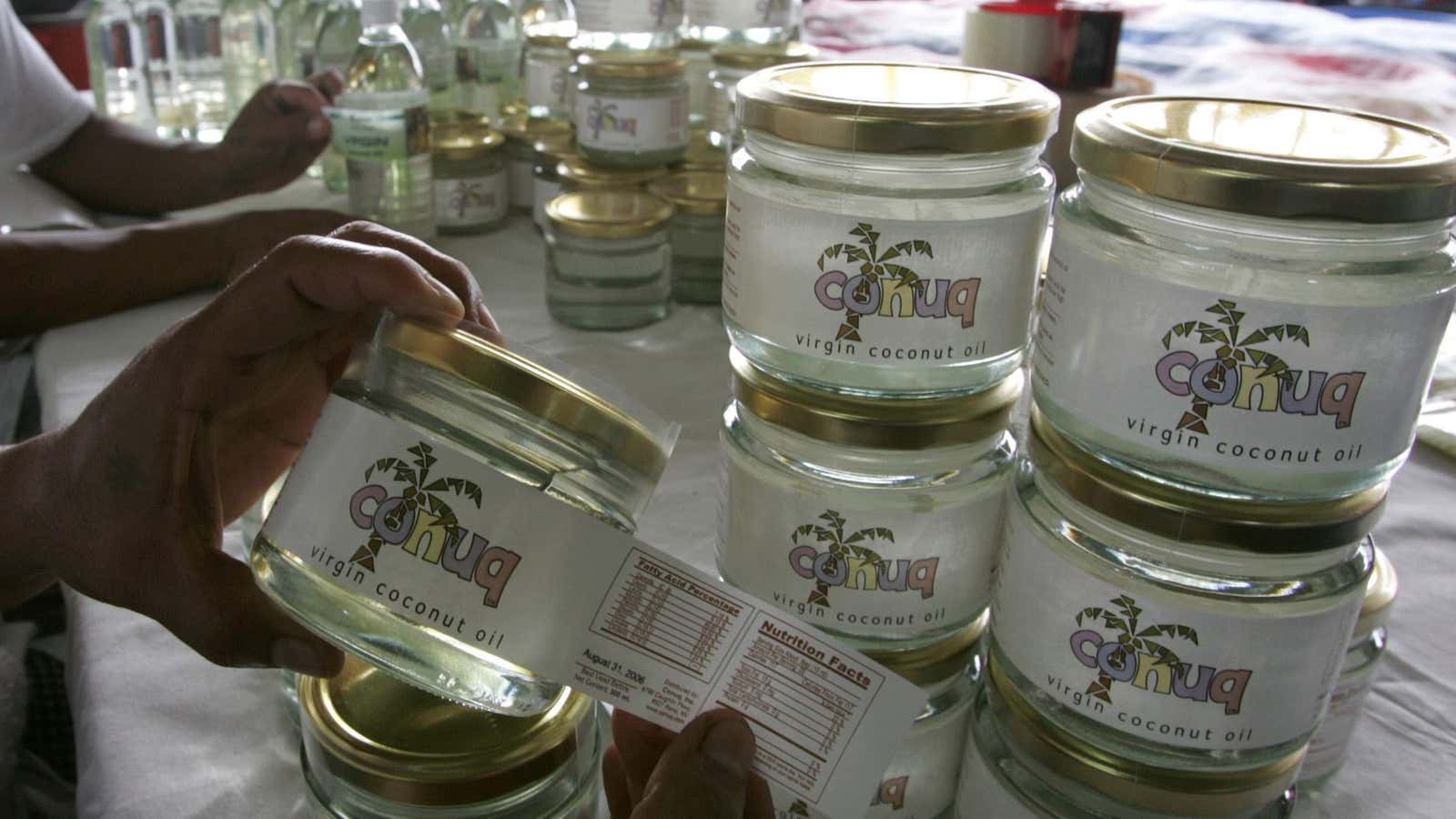Let’s get one thing out of the way: coconut oil is not poison.
Poison is something you ingest as the result of systemic race and class-based discrimination, or because a Russian spy wants you dead, or because Tide Pods. Food that happens to be high in saturated fat is still food—the amount and manner in which you consume it determines how healthy, or not, it is.
Coconut oil has been touted as a sort of miracle, and not just because it’s the best replacement for butter in vegan baked goods. Celebrities gush about its many uses, as an all-purpose beauty salve, and in the kitchen. So when the Guardian reported that Karin Michels, a scientist at the Harvard TH Chan school of public health called it “pure poison“ in a lecture at the University of Freiburg in Germany, the internet went a little nuts.
It’s not that surprising this moment has come for coconut oil. There’s an ongoing, fountain-of-youth-style search for that one, mythical fat that somehow is delicious but also makes us healthier, slimmer, and happier. Coconut oil is just the latest of many dietary tricks, hacks, and supposed miracles that get around the much simpler truth: We need fewer calories than many of us would like to eat on a daily basis.
Michels’ argument against coconut oil is that it is very high in saturated fat. This echoes the case made for margarine in the butter-versus-margarine wars of the 1980s. Back then, eaters were urged to replace butter—like coconut oil, high in saturated fat—with margarine, which, at its core, was comprised of miraculous-seeming trans-fats.
Trans fats turned out to be unequivocally bad; in particular, they were implicated in cardiovascular and heart health issues. In 2013, the US Food and Drug Administration put regulations into place that vastly reduced their footprint in processed food, and essentially forcing margarine manufacturers to reformulate their products. Still, the margarine versus butter debate rages on, with Harvard Medical School coming out slightly more in favor of butter, but also pointing out that olive oil is a better choice than either, while the Mayo Clinic is on team margarine. Even trans-fat-free margarine is more of a greasy film than a buttery spread, and good reminder that it’s generally better to eat something actually delicious in moderation than a copy of something good to excess.
It’s also an object lesson in the folly of chasing the El Dorado of food: healthy fat in unlimited quantities. Here’s another: In the 1990s, we were so afraid of fat that we not only ate a lot of terrible high-sugar, low-fat desserts, we ate potato and corn chips fried with Olestra, a fat developed in the lab to have molecules too large for our digestive systems to absorb. For many, that lack of absorption translated into stomach cramps and diarrhea. The one good thing about Olestra was that some studies found that it seemed to help remove PCBs—polychlorinated biphenyl, a known carcinogen—from the body.
Coconut oil is not like Olestra or trans fats. It’s much more like butter or lard—a calorie-dense food commonly used in some cuisines that many people find delicious. We so badly want to believe that something fried, or gooey and chocolatey, is healthy that we’re open to the idea that someone has “discovered” a fat that somehow behaves like no other fat we’ve ever encountered. Even extra-virgin olive oil, which is often anointed the healthiest of oils, because the fats it contains can actually contribute to heart health, would be unhealthy if pounded by the shot-glass full.
All this arguing over fat is a distraction from the fact that Americans don’t eat nearly enough fruits and vegetables. In 2017, the US Centers for Disease Control reported that only one American in 10 consumes produce at the recommended daily amount. Libby Mills, a nutritionist and spokesperson for Academy of Nutrition and Dietetics told The Cut that she did see one big possible advantage to eating coconut oil. “If adding some extra-virgin coconut oil to your vegetables helps you eat them,” she said, “it could turn out to be a good thing.”
